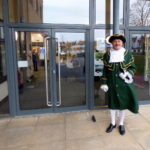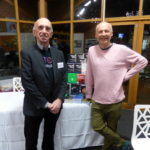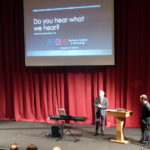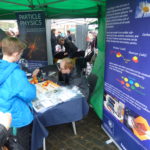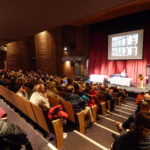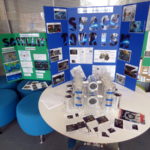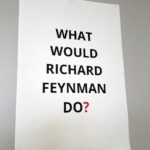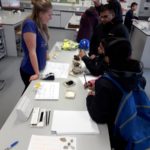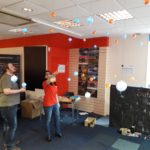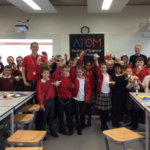The Stories from Science podcast has one goal – seek out the interesting, inspiring, quirky and compelling stories of people who work in science, and share those stories as widely as possible. Often those stories are where you might expect them to be: research facilities, science laboratories, businesses and classrooms. But what about stories in less obvious places.
Like…a vineyard?
(Listen now on SoundCloud – iTunes – Stitcher)
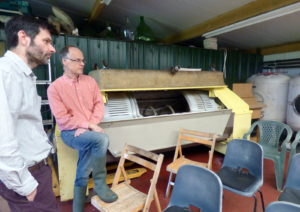 It turns out that there is a lot of science in winemaking. It even has its own name: oenology (pronounced ee-nology, as I discovered during my interview) and you don’t need to travel to France, California or Australia to learn about it. Here in Oxfordshire there is Bothy Vineyard, a small and rather wonderful creator of award-winning aromatic wines, a product of a surprising slice of British countryside with a singular geology and micro-climate.
It turns out that there is a lot of science in winemaking. It even has its own name: oenology (pronounced ee-nology, as I discovered during my interview) and you don’t need to travel to France, California or Australia to learn about it. Here in Oxfordshire there is Bothy Vineyard, a small and rather wonderful creator of award-winning aromatic wines, a product of a surprising slice of British countryside with a singular geology and micro-climate.
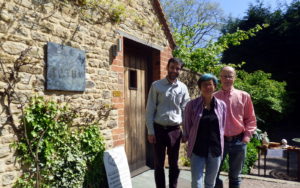
In this episode of Stories from Science, I interviewed Richard and Sian Liwicki. They run Bothy Vineyard in Frilford Heath, just outside Abingdon. They are also both professional scientists, which made it doubly appropriate that we chat to them for the podcast.
Bothy Vineyard is special for many reasons. The land on which the vineyard sits has a very unusual geology (just how unusual is explained in the interview). There are challenges to growing vines on land that isn’t sloped (the traditional terrain of a vineyard).
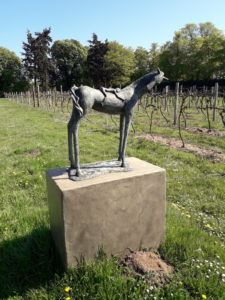 But Bothy is a pioneer in striving for sustainability in its vineyard, experimenting and persevering with biodiversity areas, and soil enrichment techniques to improve the soil and bring it ‘back to life’ from previous farming methods. In doing so, they are tapping into a long and ancient tradition of winemaking in the Vale of the White Horse.
But Bothy is a pioneer in striving for sustainability in its vineyard, experimenting and persevering with biodiversity areas, and soil enrichment techniques to improve the soil and bring it ‘back to life’ from previous farming methods. In doing so, they are tapping into a long and ancient tradition of winemaking in the Vale of the White Horse.
Bothy do not ship wine – the vast majority of wine produced is consumed locally. And they are profoundly embedded within that community, involving them in most aspects of vineyard management and some of the winemaking process. We learn about stripping parties and harvesting which are aided by a small army of local volunteers – and you can find out how to get involved (because it sounds a great deal of fun!)
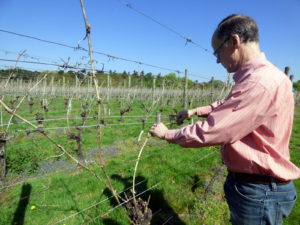 This way of running a vineyard is not without risk, and the threat of a devastating frost always hovers (quite literally) over the vines every springtime. This means wine production varies, from approximately 5,500 bottles to none. In the episode we talk about the weird and wonderful techniques that can be used to protect your harvest shared amongst vineyard owners from around the world.
This way of running a vineyard is not without risk, and the threat of a devastating frost always hovers (quite literally) over the vines every springtime. This means wine production varies, from approximately 5,500 bottles to none. In the episode we talk about the weird and wonderful techniques that can be used to protect your harvest shared amongst vineyard owners from around the world.
But the result is always worth it. In the final analysis, Bothy is special because of the quality of the aromatic wines they produce and the awards they have won. In that, they are offering a potential way forward for the development of English wines, which have a growing reputation around the world.
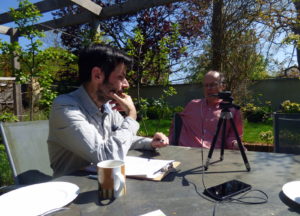 This episode was such a joy to record – not just because of Richard and Sian’s obvious passion and expertise shine through, or the fact that they were both so open and generous in guiding us through the process. We sat in a glorious part of the Oxfordshire countryside, and future episodes will have to go some way to beat that location in nature’s recording studio. There’s a bit of wind, and at one stage a stunt plane buzzes us from the nearby airfield – but apart from that, it really was an unexpected nirvana of science chat. Enjoy.
This episode was such a joy to record – not just because of Richard and Sian’s obvious passion and expertise shine through, or the fact that they were both so open and generous in guiding us through the process. We sat in a glorious part of the Oxfordshire countryside, and future episodes will have to go some way to beat that location in nature’s recording studio. There’s a bit of wind, and at one stage a stunt plane buzzes us from the nearby airfield – but apart from that, it really was an unexpected nirvana of science chat. Enjoy.
(Listen now on SoundCloud – iTunes – Stitcher)
You can learn more about Bothy Vineyard – including how to visit and get hold of wines – here. And you can discover how to support Stories from Science, and get involved in future podcasts, by visiting our Patreon page here.
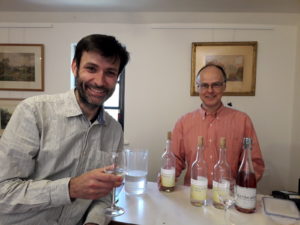
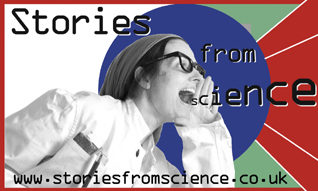
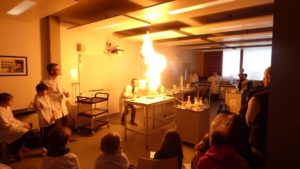 In this special episode of Stories from Science, we go behind the scenes of a very modern phenomenon: the Science Festival.
In this special episode of Stories from Science, we go behind the scenes of a very modern phenomenon: the Science Festival.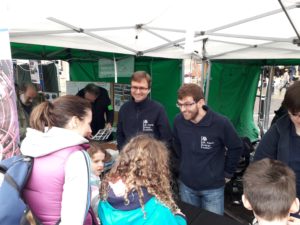 Kicking off with the Science Market (think Farmer’s Market but with science!) a whole week of talks, hands-on science activities, school’s outreach, and quirky science events culminated in the Family Science Day which saw over 500 people descend on the Yang Science Centre putting on VR goggles, looking at friendly (and not so friendly) microbes, messing around with fire, bubbles, dinosaurs, making cars and rockets – and learning about the scale of the universe.
Kicking off with the Science Market (think Farmer’s Market but with science!) a whole week of talks, hands-on science activities, school’s outreach, and quirky science events culminated in the Family Science Day which saw over 500 people descend on the Yang Science Centre putting on VR goggles, looking at friendly (and not so friendly) microbes, messing around with fire, bubbles, dinosaurs, making cars and rockets – and learning about the scale of the universe.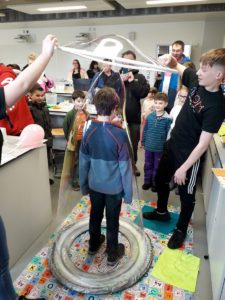 In this episode we speak to the people involved in ATOM: the speakers, communicators, organisers and audience who came along.
In this episode we speak to the people involved in ATOM: the speakers, communicators, organisers and audience who came along.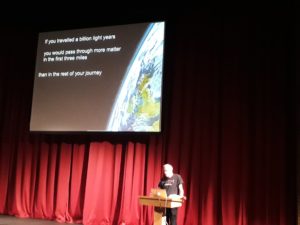 What Science Festivals do may seem obvious – lots of entertaining science events to inspire young and old alike – but when you pick apart a festival like ATOM, the results are more far-reaching, and – in at least one surprising instance – rather profound with implications for new opportunities for business and academia.
What Science Festivals do may seem obvious – lots of entertaining science events to inspire young and old alike – but when you pick apart a festival like ATOM, the results are more far-reaching, and – in at least one surprising instance – rather profound with implications for new opportunities for business and academia.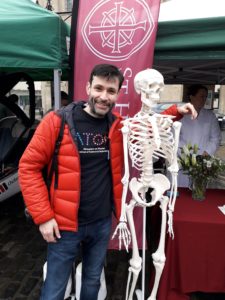 But there are lessons for everyone involve in science communication, outreach, events and other festivals. We hope this podcast gives you loads of inspiration and – for anyone involved in a science festival – ideas to help your festivals thrive.
But there are lessons for everyone involve in science communication, outreach, events and other festivals. We hope this podcast gives you loads of inspiration and – for anyone involved in a science festival – ideas to help your festivals thrive.